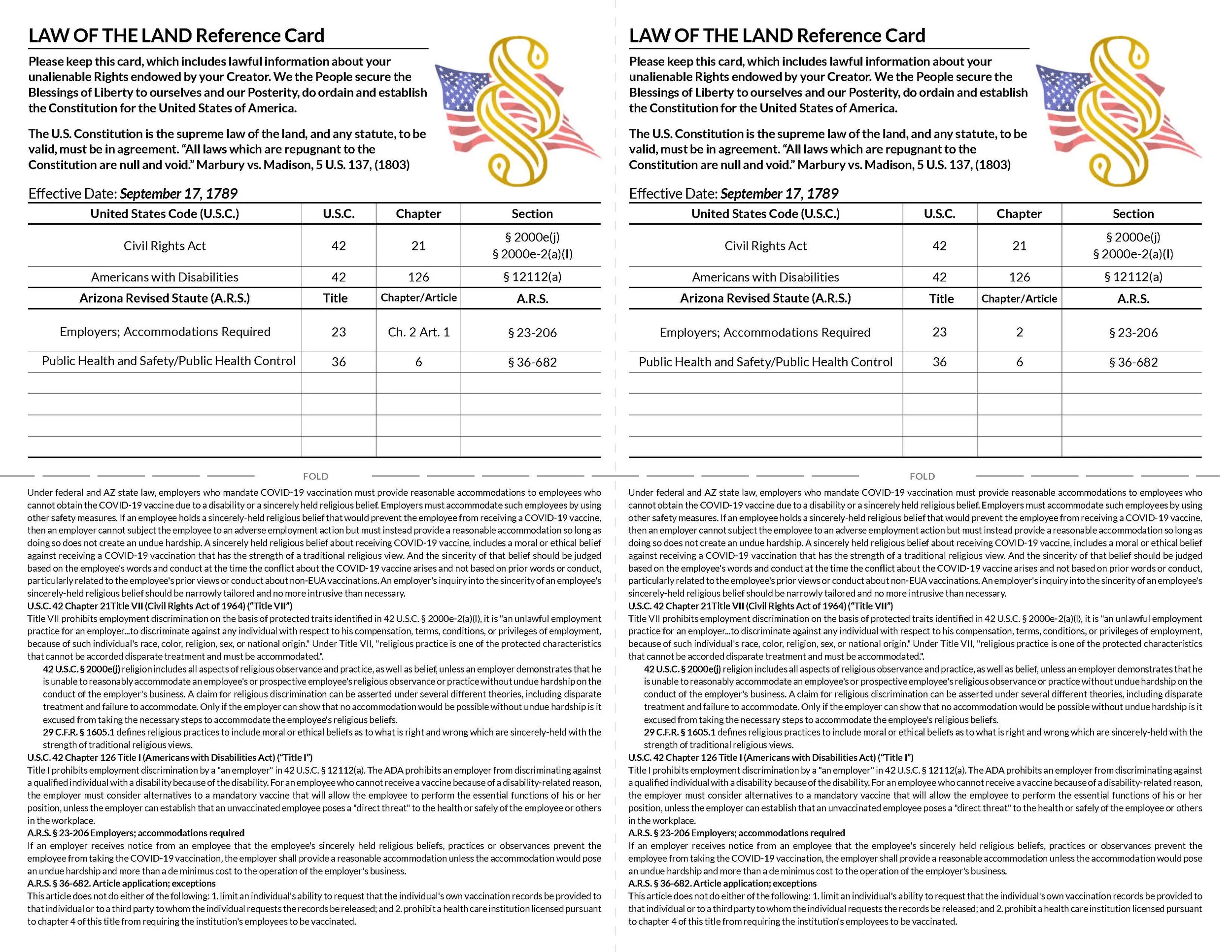LAW OF THE LAND Reference Card By Terror of the Woods
Medical tyranny is here!
Please download and print the LAW OF THE LAND Reference Card to keep on your person while you and countless other Patriots fight back using your unalienable Rights endowed by your Creator.
We the People secure the Blessings of Liberty to ourselves and our Posterity, do ordain and establish the Constitution for the United States of America.
The U.S. Constitution is the supreme law of the land, and any statute, to be valid, must be in agreement.
“All laws which are repugnant to the Constitution are null and void.” Marbury vs. Madison, 5 U.S. 137, (1803)
Now more than ever, it is imperative Americans know their constitutional rights and the laws that protect them from government overreach.
Terror of the Woods has created the LAW OF THE LAND Reference Card for your easy reference to the lawful information to help you fight back against your employer and the government who have dismissed your religious and medical exemptions against the COVID-19 vaccine.
Under federal, employers who mandate COVID-19 vaccination must provide reasonable accommodations to employees who cannot obtain the COVID-19 vaccine due to a disability or a sincerely held religious belief. Employers must accommodate such employees by using other safety measures.
If an employee holds a sincerely-held religious belief that would prevent the employee from receiving a COVID-19 vaccine, then an employer cannot subject the employee to an adverse employment action but must instead provide a reasonable accommodation so long as doing so does not create an undue hardship.
A sincerely held religious belief about receiving COVID-19 vaccine, includes a moral or ethical belief against receiving a COVID-19 vaccination that has the strength of a traditional religious view. And the sincerity of that belief should be judged based on the employee's words and conduct at the time the conflict about the COVID-19 vaccine arises and not based on prior words or conduct, particularly related to the employee's prior views or conduct about non-EUA vaccinations.
An employer's inquiry into the sincerity of an employee's sincerely-held religious belief should be narrowly tailored and no more intrusive than necessary.
Below is a list of United States Code, including the Civil Rights Act of 1964 and Americans with Disabilities Act, both are exreamlly important in this fight.
U.S.C. 42 Chapter 21Title VII (Civil Rights Act of 1964) (“Title VII”)
Title VII prohibits employment discrimination on the basis of protected traits identified in 42 U.S.C. § 2000e-2(a)(l), it is "an unlawful employment practice for an employer...to discriminate against any individual with respect to his compensation, terms, conditions, or privileges of employment, because of such individual's race, color, religion, sex, or national origin." Under Title VII, "religious practice is one of the protected characteristics that cannot be accorded disparate treatment and must be accommodated.".
42 U.S.C. § 2000e(j) religion includes all aspects of religious observance and practice, as well as belief, unless an employer demonstrates that he is unable to reasonably accommodate an employee's or prospective employee's religious observance or practice without undue hardship on the conduct of the employer's business. A claim for religious discrimination can be asserted under several different theories, including disparate treatment and failure to accommodate. Only if the employer can show that no accommodation would be possible without undue hardship is it excused from taking the necessary steps to accommodate the employee's religious beliefs.
29 C.F.R. § 1605.1defines religious practices to include moral or ethical beliefs as to what is right and wrong which are sincerely-held with the strength of traditional religious views.
U.S.C. 42 Chapter 126 Title I (Americans with Disabilities Act) (“Title I”)
Title I prohibits employment discrimination by a "an employer" in 42 U.S.C. § 12112(a). The ADA prohibits an employer from discriminating against a qualified individual with a disability because of the disability. For an employee who cannot receive a vaccine because of a disability-related reason, the employer must consider alternatives to a mandatory vaccine that will allow the employee to perform the essential functions of his or her position, unless the employer can establish that an unvaccinated employee poses a "direct threat" to the health or safely of the employee or others in the workplace.

